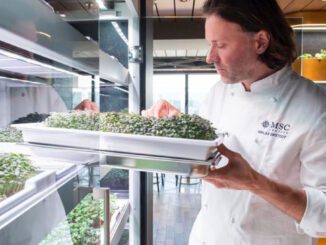
IS THIS THE FUTURE OF THE FARMING INDUSTRY?
Small Scale Vertical Farming | Rachael Sutherland |
Growing vertically is being harnessed across the city to grow fresh herbs, pea shoots and even willow trees.
While most supermarket herbs travel hundreds of miles before they reach our shelves, Alasdair Marchant’s are grown and picked fresh in Bristol at his indoor farm on Chapel Street, in St Philip’s Marsh, just down the road from Temple Meads.
The 28-year-old sells flat-leaf parsley, dill, coriander, chives and chervil with the roots on to keep them fresh and flavourful.
Through vertical farming methods, his herbs grow three times as fast as they would outside. In the summer it’s even quicker, his parsley can take five weeks to grow, in contrast to taking three or four months outdoors.

While most supermarket herbs travel hundreds of miles before they reach our shelves, Alasdair Marchant’s are grown and picked fresh at his indoor farm on Chapel Street – photo: Alasdair Marchant
Alasdair, who is lives on Gloucester Road, set up Bristol Urban Farms two years ago and runs the show mainly by himself alongside his small team of volunteers.
With no previous experience in horticulture nor farming, he learned the tricks of the trade through YouTube tutorials as he also navigated how to go about setting up and running his first business.
Vertical farming is all about growing more with less space and doing so while using up to 98 per cent less water than traditional farming.
Indoor farming uses hydroponics to create a controlled environment which replaces sunlight with LED lights, ground up coconuts to replace soil and water mixed with nutrients, the holy trinity for fresh, tasty greenery. All of which can be done in the middle of a city under a roof.

Vertical farming is all about growing more with less space and doing so while using up to 98 per cent less water than traditional farming – photo: Alasdair Marchant
Alasdair’s urban farm supplies shops and restaurants like Garden of Easton, Poco, Better Food, Hugo’s, Reg The Veg and Tobacco Factory’s shop, with pea shoots, microgreens and microsalads.
Microgreens are, as Alasdair describes, “baby versions of bigger plants which have really intense flavour and are highly nutritious”.
He added: “There are a lot of businesses in Bristol who are really into that, and they’re easy to get on board but the challenge is getting the bigger companies on board with it too.
“You’re kind of creating a new category of business while getting people over the fact that it’s a new model – restaurants don’t typically source their food from one farm.
“Some vertical farms have come and gone across the UK, it’s not as established as a business yet so there’s not a lot of knowledge out there.”
Alasdair heard about the concept after finishing his degree in textile design and thought “Bristol seems like the perfect place to set up something like that”.
Inside the farm Alasdair is able “to create the perfect day, every day with consistent and controlled conditions.”
It’s a more sustainable way to grow, it uses a lot less land and water. A lack of fertiliser and pesticides means the surrounding ecosystem and the produce is not impacted.
“Some estimates say vertical farming uses up to 98 per cent less water as the water doesn’t evaporate off the produce as it does outdoors,” Alasdair explained.
“Take a field the size of this room, which is around 70 metres squared, versus this room using vertical farming techniques, you can grow between 50 and 100 times more in this space. The shelves I’ve got now are quite low but I could keep building higher to make even more use of this space.”

Bristol Urban Farms pictured is Alasdair Marchant photo Alasdair Marchant
He hopes to spread the word as much as possible in the city before branching out to neighbouring cities like Bath.
Looking to the future, he wants to create a properly insulated room so he can grow his herbs all year around, without sticking to seasonal produce.
Alasdair added: “I wanted to create a business which doesn’t make more stuff which we don’t really need. Whereas food is something we do need.
“I really wanted to work in food production and to change it from the inside, so it’s more sustainable.
“My degree has really allowed me to think creatively in this job and to innovate and I think this fairly new category of farming needs a lot of innovation to survive.”
Just two miles down the road in St Anne’s, high energy music fills the labs at LettUs Grow as its team of young scientists and growers harvest freshly grown pea shoots, which are ready to pick in under a week using aeroponics.
Read the Entire Original Article Here: https://www.bristol247.com/business/features-business/is-this-the-future-of-the-farming-industry/



